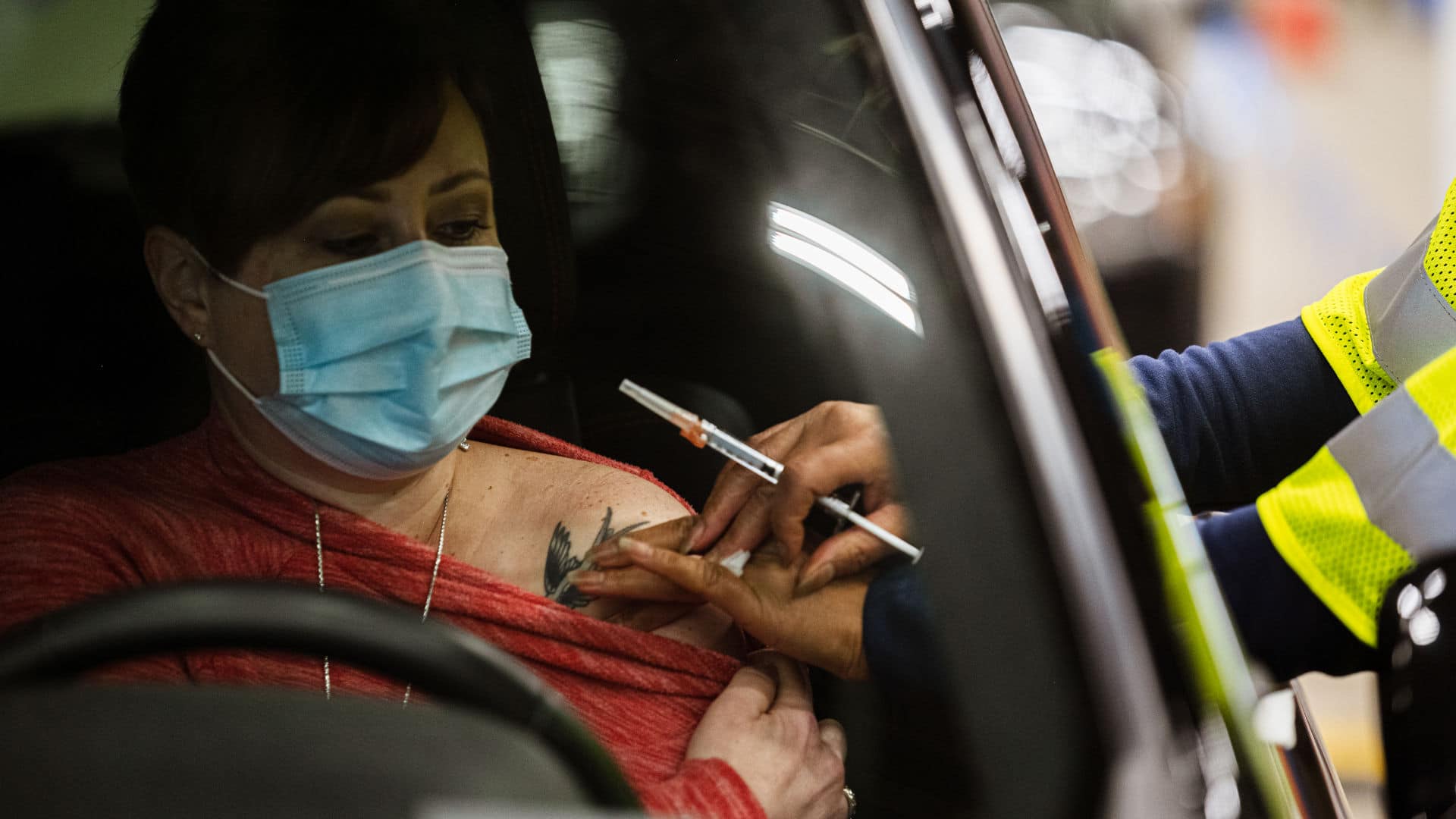Four weeks ago, the Food and Drug Administration granted emergency authorization to the first Covid-19 vaccine in the U.S., launching a nationwide race to vaccinate hundreds of millions of people amid surging cases. Before the authorization, White House officials had said they aimed to vaccinate at least 20 million people by the end of December, and 25 million to 30 million per month starting in 2021.
Not everyone found those projections convincing. The skepticism was warranted: According to a Washington Post estimate based on state and federal data, only around 5.9 million people have been vaccinated — fewer than might be expected from the 21.4 million doses that have been distributed already, and far behind White House benchmarks. Doses sit unused on pharmacy shelves, while thousands of people die from the virus each day in the U.S.
The U.S. is hardly alone in a slow vaccine rollout: Critics have also charged the European Union with botching the beginning of its vaccination campaign. And distributing sensitive pharmaceuticals to millions of people each week is not a simple task.
Still, the rollout has been characterized by rancor and dysfunction — and, critics say, simple inattention — from leaders in Washington. Late last month, as vaccine operations commenced, congressional leaders and President Donald Trump were engaged in a prolonged battle over stimulus checks for millions of Americans. This week, vaccination efforts were overshadowed by a violent mob breaching the U.S. Capitol at the apparent prompting of Trump. During this political unrest, Covid-19 fatalities kept mounting: On Wednesday, as rioters stormed Congress, an estimated 3,865 people died from Covid-19 in the U.S., a new record. The next day, the record was set again: For the first time, according to federal statistics, more than 4,000 people in the U.S. died from Covid-19 in a single day.
Amid the turmoil, states have received little support for their vaccination efforts from Trump and other leaders, critics say. Instead, the burdens have fallen on overworked, long-underfunded local and state health departments, who are trying to simultaneously run Covid-19 testing and vaccination efforts on top of their other duties.
Some frontline health care workers, who the Centers for Disease Control and Prevention recommend be among the first to receive the shots, are still waiting for their immunizations.
“The rollout so far has been heartbreaking to witness from the standpoint of primary care,” said one physician, who works for a company that supports independent clinics, in an interview with STAT. “Many are angry and frustrated and fed up, frankly,” she added. “They’re absolutely downtrodden.”
Also in the News:
• The U.S. Environmental Protection Agency, led by a Trump-appointed former coal industry lobbyist, Andrew Wheeler, finalized a new rule this week that deliberately restricts the type of scientific studies the agency can use to regulate pollutants. Described by Wheeler as an important measure for transparency, the guidelines direct the agency to rely only on studies in which all the data is available to the public. But many critics say the rule’s primary effect will be to block the EPA from using important research that draws on human health data, which is often protected by privacy laws, or essential information from industry, which may be considered proprietary. Versions of the contentious regulation have been circulating in Washington for years, despite sustained opposition from public health researchers and major scientific organizations. This week, when Wheeler announced the rule’s finalization, the American Association for the Advancement of Science (AAAS) immediately issued a statement warning that it “severely undermines the use of science in making informed decisions.” Andrew Rosenberg of the Union of Concerned Scientists echoed that criticism: “It has no merits from the standpoint of science or transparency, and it will make it vastly harder for the agency to do its job of protecting public health and the environment,” he said. Critics are hoping that a Democrat-controlled Congress and White House will be able to repeal the regulation. (Multiple Sources)
• Democrats took back control of the Senate on Wednesday, setting the stage for a possible shift in federal science and climate policy. Following the victories of Democrats Raphael Warnock and Jon Ossoff in their Georgia election runoffs, Republicans and Democrats will each control 50 seats in the Senate, giving Vice-President elect Kamala Harris the tie-breaking vote. While Democrats will still require Republican support to get the 60 votes needed to advance most legislation in the upper chamber, their control of Congress and the White House means they could use a law known as the Congressional Review Act to undo regulations passed by the Trump administration. According to Science, “potential targets would include Trump rules that weakened air pollution and endangered species laws and a new rule limiting the kinds of research the Environmental Protection Agency can use when writing new regulations.” Senators could also use a second process known as reconciliation — famously employed to advance the Affordable Care Act in 2010 — to move forward certain legislation with a simple majority of 51 votes. Still, with the urgency of addressing the Covid-19 pandemic, those legislative battles may have to compete with other priorities. (Science)
• As Covid-19 vaccine rollouts proceed and millions of recovered individuals return to their lives, a major question remains: How long does immunity last after a Covid-19 infection? A study published this week in Science may offer some preliminary answers. Researchers collected one or more blood samples from 188 people with Covid-19 between six days and 8 months after their symptoms began, with 43 of the samples collected after 6 months. By analyzing the number of immune cells present in the blood over time, the team could assess the strength of the immunological memory — or how well each person’s immune system recognized and responded to SARS-CoV-2. Although levels varied between individuals, the researchers saw a moderate decline in antibodies eight months after infection. Other immune cells, like two types of T-cell, declined only modestly, or in the case of B-cells, held steady or even grew. While the study was small, short, and could not ethically seek to test how any of the subjects responded to reinfection, the results contrast earlier studies predicting fast-fading immunity. On Twitter, study co-author Shane Crotty, a researcher at the La Jolla Institute for Immunology, wrote that the results suggest “the immune system can remember the SARS-CoV-2 virus for years, and most people may be protected from severe Covid-19 for substantial time. Which is certainly good news!” (Science)
• On Monday, some 230 Google employees announced that they were unionizing, a step that follows years of protests, walkouts, and activism aimed at changing the technology company’s culture. The announcement created a stir in Silicon Valley, where organized labor movements have traditionally struggled to gain traction. Within 24 hours, say union officials, the organization’s ranks had swelled to more than 400. But that still represents only a slim fraction of Google’s more than 200,000 employees and contractors. As a so-called minority union, the group is likely to lack much of the political and legal sway of traditional majority unions. However, members say that their goals go beyond negotiating better contracts. “We’re going to use every tool that we can to use our collective action to protect people who we think are being discriminated against or retaliated against,” Chewy Shaw, one of the union’s leaders, told The New York Times. Employees have been rankled, for instance, by Google’s decision to fire an AI ethics officer who was critical of machine learning bias, and by the company’s controversial handling of sexual harassment. Google responded with a statement saying it respects its employees’ labor rights. (The Verge)
• On Monday, Desmond Tan, Singapore’s Minister of State for Home Affairs, announced that police could use the country’s Covid-19 contact tracing system for criminal investigations. When the app, called TraceTogether, launched in March 2020, the government’s outline did not include the use of public health data by law enforcement, and critics are calling the announcement a reversal of policy. The decision also comes shortly after Singapore’s government made use of the TraceTogether system mandatory for entering public spaces like grocery stores, further elevating privacy concerns. For months, organizations such as Human Rights Watch have cautioned that the expanded digital oversight afforded by contact tracing tools could be used to violate basic rights and surveil persecuted groups. As of now, roughly 80 percent of Singapore’s 5.7 million residents use TraceTogether. (MIT Technology Review)
• And finally: Earlier this week, the motive behind a Wisconsin pharmacist’s attempted destruction of 570 doses of Covid-19 vaccine became clearer: He believed, falsely, that the vaccine would harm patients. According to The New York Times, Steven Brandenburg, a hospital pharmacist at Aurora Medical Center in Grafton, Wisconsin, is a self-avowed conspiracy theorist who thought that the vaccine would alter people’s DNA. The vaccine, made by Moderna, contains genetic material — messenger RNA, or mRNA — that helps build specific proteins found in SARS-CoV-2, the virus that causes Covid-19. This allows a recipient’s immune system to learn to detect the virus without having to come into contact with the virus itself. Moderna’s vaccine generally requires freezer storage, where it can last for six months, although it also remains viable for 30 days in a refrigerator and 12 hours at room temperature. Brandenburg left the 570 vials out overnight, potentially ruining an estimated $8,000 to $12,000-worth of vaccine. On Dec. 31, Brandenburg was arrested on felony charges, although the charges could be changed to a misdemeanor if the vaccines are still viable. “My understanding is that the respondent is more aligned with the feeling of conspiracy theories,” a divorce attorney for Brandenburg’s wife told The Times. “He has theories about Covid-19. He believes the end of the world is coming.” (The New York Times)
“Also in the News” items are compiled and written by Undark staff. Deborah Blum, Brooke Borel, Lucas Haugen, Jane Roberts, Frankie Schembri, and Ashley Smart contributed to this roundup.










